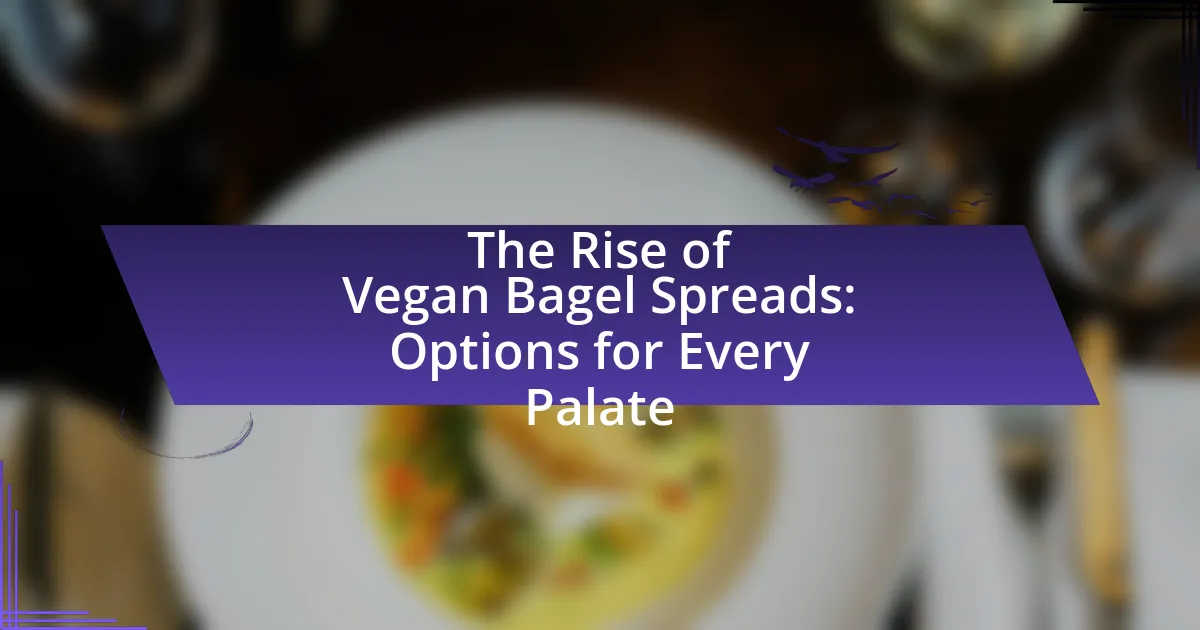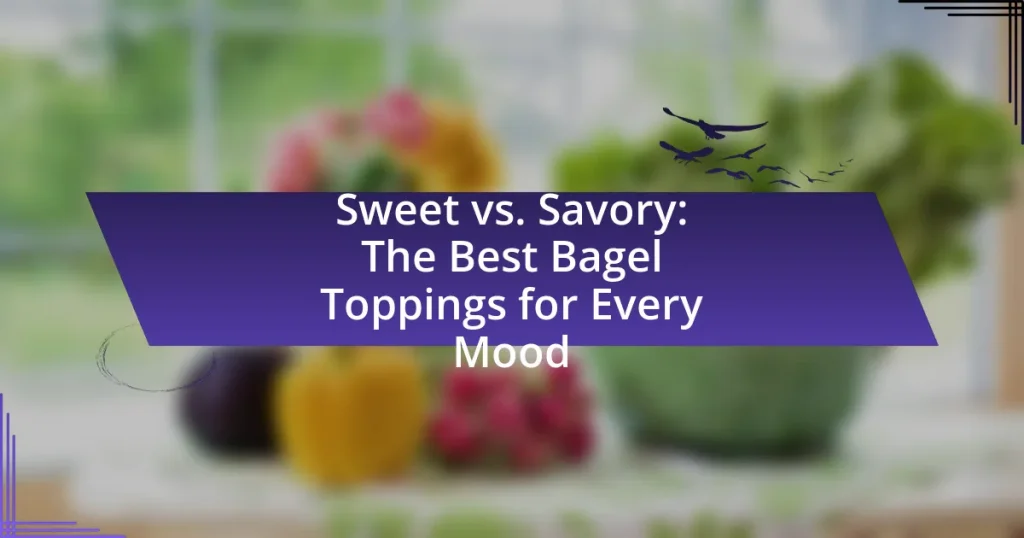Vegan bagel spreads are plant-based toppings that enhance the flavor of bagels without using animal products, including options like hummus, avocado spread, nut butters, and vegetable-based cream cheeses. These spreads differ from traditional options by utilizing ingredients such as nuts, seeds, and legumes, providing a creamy texture and rich flavors while catering to diverse dietary preferences. The article explores the growing popularity of vegan bagel spreads, driven by health consciousness, ethical considerations, and environmental sustainability, as well as the various types, flavors, and nutritional benefits they offer. Additionally, it discusses how these spreads can be incorporated into meals and the economic and market trends influencing their rise in the food industry.
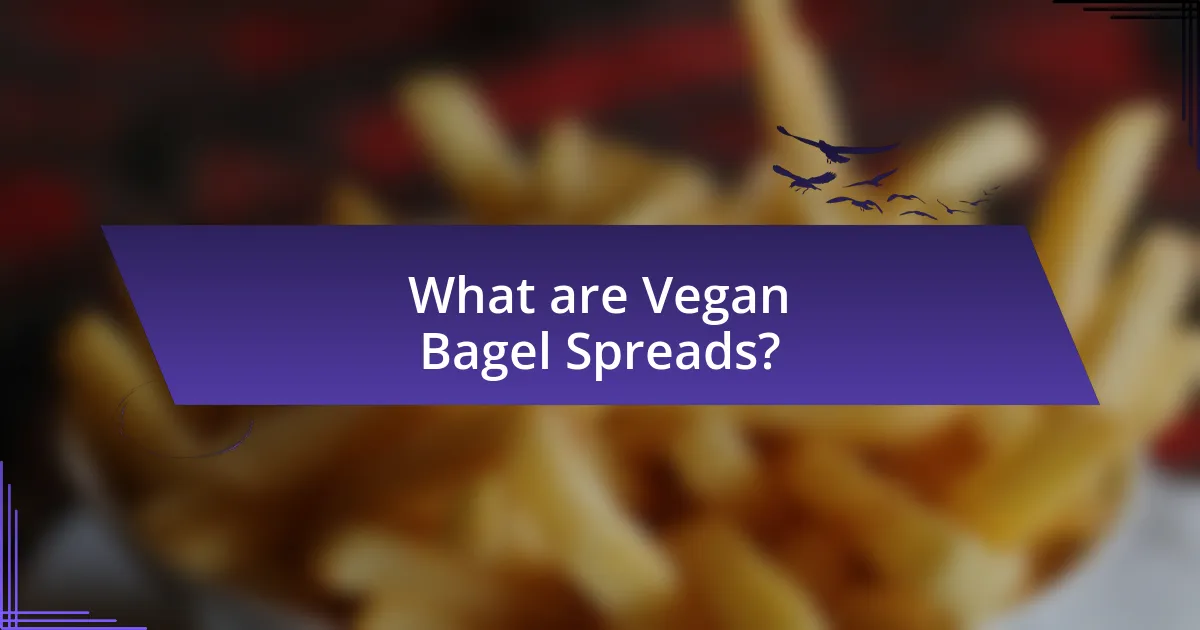
What are Vegan Bagel Spreads?
Vegan bagel spreads are plant-based toppings designed to enhance the flavor of bagels without using animal products. Common examples include hummus, avocado spread, nut butters, and various vegetable-based cream cheeses made from ingredients like cashews or tofu. These spreads cater to diverse dietary preferences and are often rich in nutrients, providing alternatives that align with vegan lifestyles. The increasing popularity of veganism has led to a wider variety of these spreads being available in grocery stores and cafes, reflecting a growing demand for plant-based options in the food market.
How do Vegan Bagel Spreads differ from traditional spreads?
Vegan bagel spreads differ from traditional spreads primarily in their ingredients, as they do not contain any animal products. Traditional spreads often include dairy-based components like cream cheese or butter, while vegan alternatives utilize plant-based ingredients such as nuts, seeds, tofu, or avocado to achieve similar textures and flavors. For example, a common vegan cream cheese substitute is made from blended cashews, which provides a creamy consistency without dairy. This shift towards plant-based options aligns with growing dietary preferences and health considerations, as many consumers seek to reduce animal product consumption for ethical or health reasons.
What ingredients are commonly used in Vegan Bagel Spreads?
Common ingredients used in vegan bagel spreads include plant-based cream cheese, hummus, avocado, nut butters, and various herbs and spices. Plant-based cream cheese is often made from nuts or soy, providing a creamy texture similar to traditional cream cheese. Hummus, made from chickpeas, tahini, and olive oil, offers a savory option rich in protein. Avocado provides healthy fats and a smooth consistency, while nut butters, such as almond or peanut butter, add a sweet and nutty flavor. Additionally, herbs like dill, chives, and spices such as garlic powder enhance the taste of these spreads, making them versatile for different palates.
How do these ingredients contribute to flavor and texture?
Vegan bagel spreads typically include ingredients such as nuts, seeds, legumes, and plant-based oils, which contribute to both flavor and texture. Nuts and seeds provide a rich, creamy texture and a nutty flavor, enhancing the overall mouthfeel of the spread. For example, cashews create a smooth, buttery consistency when blended, while sunflower seeds add a slightly crunchy texture. Legumes, like chickpeas, contribute a hearty, dense texture and a savory flavor, often enhanced with spices or herbs. Plant-based oils, such as olive or avocado oil, add richness and a silky texture, while also amplifying the flavors of other ingredients. This combination results in a diverse range of flavors and textures, appealing to various palates and dietary preferences.
Why has the popularity of Vegan Bagel Spreads increased?
The popularity of Vegan Bagel Spreads has increased due to a growing consumer demand for plant-based options and heightened awareness of health and environmental issues. Research indicates that the plant-based food market is projected to reach $74.2 billion by 2027, driven by consumers seeking healthier alternatives and sustainable food choices. Additionally, the rise of social media and food influencers has amplified the visibility of vegan products, making them more appealing to a broader audience.
What trends in dietary preferences are influencing this rise?
The rise of vegan bagel spreads is influenced by increasing consumer demand for plant-based diets. This trend is driven by health consciousness, environmental concerns, and ethical considerations regarding animal welfare. According to a 2021 report by the Plant Based Foods Association, the plant-based food market grew by 27% in the past year, indicating a significant shift in dietary preferences towards vegan options. Additionally, a survey by Ipsos revealed that 39% of Americans are trying to incorporate more plant-based foods into their diets, further supporting the rise of vegan products like bagel spreads.
How do health benefits play a role in the popularity of Vegan Bagel Spreads?
Health benefits significantly enhance the popularity of Vegan Bagel Spreads by appealing to health-conscious consumers. These spreads are often lower in saturated fats and cholesterol-free, making them heart-healthy alternatives to traditional cream cheeses. Additionally, many vegan spreads are rich in nutrients, such as fiber, vitamins, and antioxidants, which contribute to overall well-being. Research indicates that plant-based diets can lower the risk of chronic diseases, further driving interest in vegan options. For instance, a study published in the Journal of the American Heart Association found that plant-based diets are associated with a reduced risk of heart disease. This growing awareness of health benefits is a key factor in the increasing demand for Vegan Bagel Spreads.
What types of Vegan Bagel Spreads are available?
Various types of vegan bagel spreads are available, including hummus, avocado spread, nut butters, vegan cream cheese, and fruit preserves. Hummus, made from chickpeas, offers a protein-rich option, while avocado spread provides healthy fats and a creamy texture. Nut butters, such as almond or peanut butter, deliver a satisfying taste and additional nutrients. Vegan cream cheese alternatives, often made from nuts or soy, mimic traditional cream cheese flavors without animal products. Fruit preserves, made from fruits and sweeteners, add a sweet contrast to savory spreads. These options cater to diverse tastes and dietary preferences, reflecting the growing demand for plant-based foods.
What are the most popular flavors of Vegan Bagel Spreads?
The most popular flavors of vegan bagel spreads include hummus, avocado, cashew cream cheese, and nut butters. Hummus is favored for its creamy texture and versatility, often enhanced with flavors like garlic or roasted red pepper. Avocado spread is popular for its healthy fats and rich taste. Cashew cream cheese offers a dairy-free alternative that mimics traditional cream cheese, often flavored with herbs or spices. Nut butters, such as almond or peanut butter, are also widely enjoyed for their protein content and satisfying flavor. These flavors cater to diverse dietary preferences and enhance the bagel experience.
How do different brands differentiate their Vegan Bagel Spreads?
Different brands differentiate their Vegan Bagel Spreads through unique flavor profiles, ingredient sourcing, and packaging design. For instance, some brands focus on bold flavors like spicy harissa or garlic and herb, while others may emphasize classic tastes such as plain or sweet options like maple. Ingredient sourcing also varies; brands may highlight organic, locally sourced, or specialty ingredients like cashews or nutritional yeast to appeal to health-conscious consumers. Additionally, packaging design plays a role in brand identity, with some brands opting for eco-friendly materials or eye-catching graphics to attract attention on store shelves. These strategies help brands carve out distinct market positions in the growing vegan spread segment.
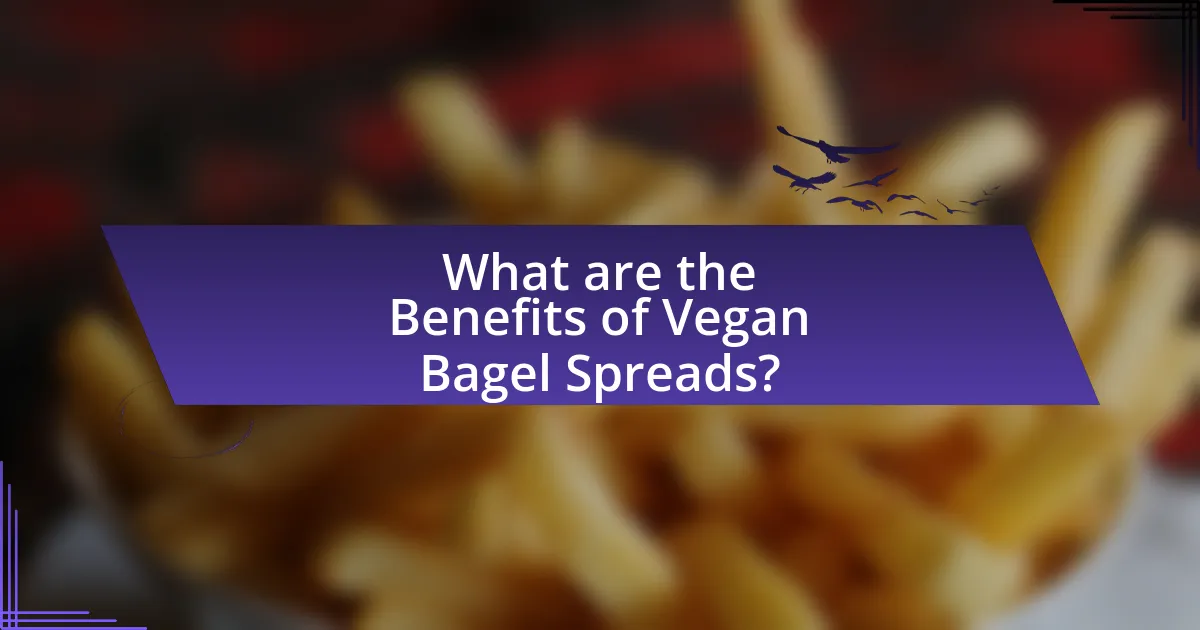
What are the Benefits of Vegan Bagel Spreads?
Vegan bagel spreads offer numerous benefits, including health advantages, ethical considerations, and environmental sustainability. These spreads are typically lower in saturated fats and cholesterol-free, making them heart-healthy alternatives to traditional cream cheese. Additionally, they often contain nutrient-rich ingredients such as nuts, seeds, and vegetables, which provide essential vitamins and minerals. Ethically, vegan spreads align with animal welfare principles by avoiding animal-derived ingredients. Environmentally, plant-based spreads contribute to reduced greenhouse gas emissions and lower resource consumption compared to dairy production. Studies indicate that adopting a plant-based diet can significantly decrease one’s carbon footprint, reinforcing the environmental benefits of vegan options.
How do Vegan Bagel Spreads contribute to a healthy diet?
Vegan bagel spreads contribute to a healthy diet by providing nutrient-dense alternatives to traditional spreads, often containing healthy fats, proteins, and vitamins. For instance, spreads made from avocados or nuts offer monounsaturated fats that support heart health, while those based on legumes provide plant-based protein and fiber, which aid in digestion and promote satiety. Additionally, many vegan spreads are lower in saturated fats and cholesterol compared to dairy-based options, aligning with dietary guidelines that recommend reducing these components for better cardiovascular health.
What nutritional advantages do Vegan Bagel Spreads offer?
Vegan bagel spreads offer several nutritional advantages, including lower saturated fat content, increased fiber, and a variety of vitamins and minerals. These spreads, often made from plant-based ingredients like nuts, seeds, and legumes, provide healthy fats and protein while avoiding cholesterol found in animal products. For instance, spreads made from avocados or nut butters are rich in monounsaturated fats, which can support heart health. Additionally, many vegan spreads incorporate ingredients like hummus or bean-based spreads, which are high in fiber, promoting digestive health and satiety.
How can Vegan Bagel Spreads fit into various dietary lifestyles?
Vegan bagel spreads can seamlessly fit into various dietary lifestyles by providing plant-based options that cater to different nutritional needs. For individuals following a vegan diet, these spreads offer a dairy-free alternative that aligns with their ethical and health choices. Gluten-free diets can also be accommodated, as many vegan spreads are made from ingredients like nuts, seeds, or legumes that do not contain gluten. Additionally, those on low-carb or ketogenic diets can enjoy spreads made from avocados or nut butters, which are high in healthy fats and low in carbohydrates. Furthermore, vegan bagel spreads can be enriched with superfoods, such as chia seeds or nutritional yeast, appealing to health-conscious consumers seeking nutrient-dense options. This versatility allows vegan bagel spreads to be integrated into a wide range of dietary preferences, making them suitable for diverse eating habits.
Why are Vegan Bagel Spreads considered environmentally friendly?
Vegan bagel spreads are considered environmentally friendly because they typically use plant-based ingredients that have a lower carbon footprint compared to animal-derived products. For instance, producing plant-based ingredients like nuts, seeds, and vegetables generally requires less water and land and emits fewer greenhouse gases than dairy or meat products. Research indicates that shifting towards a plant-based diet can reduce individual carbon footprints by up to 50%, highlighting the significant environmental benefits of vegan options.
What impact do plant-based spreads have on sustainability?
Plant-based spreads significantly enhance sustainability by reducing greenhouse gas emissions associated with animal agriculture. Research indicates that plant-based diets can lower carbon footprints by up to 50% compared to diets high in animal products. Additionally, the production of plant-based spreads typically requires less water and land, with studies showing that producing one kilogram of plant-based ingredients uses approximately 80% less water than producing one kilogram of dairy butter. This shift towards plant-based options contributes to more sustainable food systems and helps mitigate climate change impacts.
How does choosing Vegan Bagel Spreads reduce carbon footprint?
Choosing vegan bagel spreads reduces carbon footprint by eliminating animal-based ingredients, which are associated with higher greenhouse gas emissions. For instance, the production of dairy and meat contributes significantly to carbon emissions due to methane release from livestock and energy-intensive farming practices. In contrast, plant-based spreads typically require less land, water, and energy to produce, resulting in a lower overall environmental impact. Research indicates that adopting a vegan diet can reduce an individual’s carbon footprint by up to 50%, highlighting the substantial benefits of choosing vegan options like bagel spreads.
What are the economic benefits of choosing Vegan Bagel Spreads?
Choosing vegan bagel spreads can lead to significant economic benefits, primarily through cost savings and market growth. Vegan ingredients often have lower production costs compared to animal-based products, which can translate to lower retail prices for consumers. Additionally, the rising demand for plant-based options has led to increased market opportunities, with the global vegan food market projected to reach $31.4 billion by 2026, according to a report by Fortune Business Insights. This growth can stimulate local economies by creating jobs in production, distribution, and retail sectors focused on vegan products.
How do Vegan Bagel Spreads compare in cost to traditional spreads?
Vegan bagel spreads generally cost more than traditional spreads. For instance, a typical vegan cream cheese alternative can range from $3 to $6 for an 8-ounce container, while traditional cream cheese usually costs between $2 to $4 for the same size. This price difference is often attributed to the higher cost of plant-based ingredients and production methods. Additionally, a study by the Plant-Based Foods Association indicates that plant-based products tend to have a premium price point due to their niche market status and the sourcing of quality ingredients.
What market trends are emerging in the Vegan Bagel Spread industry?
Emerging market trends in the Vegan Bagel Spread industry include a growing demand for plant-based ingredients, increased consumer awareness of health benefits, and a rise in innovative flavor profiles. The plant-based food market is projected to reach $74.2 billion by 2027, indicating a significant shift towards vegan options. Additionally, consumers are increasingly seeking spreads that are not only dairy-free but also high in protein and low in sugar, reflecting a broader trend towards healthier eating habits. Flavor innovation is also on the rise, with brands experimenting with unique combinations such as spicy, savory, and sweet profiles to cater to diverse palates.
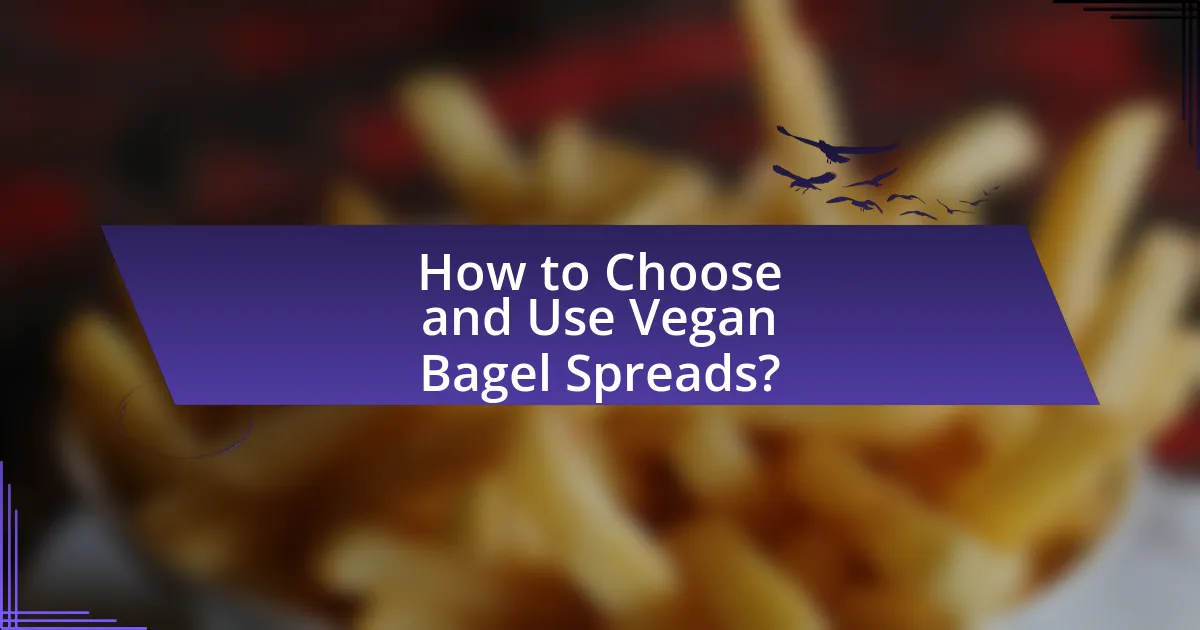
How to Choose and Use Vegan Bagel Spreads?
To choose and use vegan bagel spreads, first identify your flavor preferences and dietary needs, as options include hummus, avocado, nut butters, and plant-based cream cheeses. Selecting a spread that complements the bagel type enhances the overall taste; for instance, a savory bagel pairs well with hummus or avocado, while a sweeter bagel may be better suited for nut butter. Additionally, consider the nutritional content, such as protein and healthy fats, to align with your dietary goals. Using the spread involves evenly applying it to the bagel, ensuring a balanced flavor in each bite.
What should you consider when selecting a Vegan Bagel Spread?
When selecting a Vegan Bagel Spread, consider the ingredients to ensure they are plant-based and free from animal products. Look for spreads that use natural ingredients like nuts, seeds, or legumes, as these provide essential nutrients and flavor. Additionally, check for allergens such as soy or gluten, which may affect dietary restrictions. Nutritional content, including protein, fat, and sugar levels, is also important for a balanced diet. Finally, consider the flavor profile to match personal taste preferences, as options range from savory to sweet, enhancing the overall bagel experience.
How do dietary restrictions influence your choice of Vegan Bagel Spreads?
Dietary restrictions significantly influence the choice of vegan bagel spreads by dictating which ingredients are acceptable for consumption. For instance, individuals with gluten intolerance will opt for gluten-free spreads, while those with nut allergies will avoid nut-based options like almond or cashew spreads. Additionally, people following a low-sugar diet may prefer spreads that are free from added sugars, such as avocado or hummus, which are naturally low in sugar. This alignment with dietary needs ensures that consumers can enjoy vegan bagel spreads without compromising their health or dietary guidelines.
What flavor profiles should you look for based on personal preference?
When considering flavor profiles for vegan bagel spreads based on personal preference, individuals should look for creamy, savory, sweet, and spicy options. Creamy profiles can be achieved through ingredients like cashew cream or avocado, providing a rich texture. Savory flavors often come from ingredients such as nutritional yeast or garlic, which add depth and umami. Sweet profiles can be created using fruit spreads or maple syrup, appealing to those who enjoy a sweeter taste. Spicy options, incorporating elements like sriracha or jalapeños, cater to those who prefer heat. These flavor profiles align with diverse taste preferences, ensuring a satisfying experience for various palates.
How can you incorporate Vegan Bagel Spreads into your meals?
Vegan bagel spreads can be incorporated into meals by using them as toppings on bagels, enhancing the flavor and nutritional value. For instance, spreads like hummus, avocado, or nut-based cream cheeses can be paired with fresh vegetables, herbs, or spices to create a nutritious breakfast or snack. Additionally, these spreads can serve as dips for vegetables or crackers, or as a base for open-faced sandwiches, providing a versatile option for various meal types. The growing popularity of vegan spreads reflects a shift towards plant-based diets, with many consumers seeking healthier, cruelty-free alternatives that still offer rich flavors and textures.
What are some creative ways to use Vegan Bagel Spreads beyond bagels?
Vegan bagel spreads can be creatively used in various ways beyond traditional bagels. They serve as excellent dips for fresh vegetables, enhancing the flavor of carrots, cucumbers, and bell peppers. Additionally, these spreads can be used as a flavorful base for sandwiches, adding a creamy texture and rich taste to wraps or bread. They can also be incorporated into pasta dishes, acting as a sauce that adds depth and creaminess. Furthermore, vegan bagel spreads can be used in salad dressings, blended with vinegar or lemon juice to create a unique dressing. Lastly, they can be spread on crackers or used as a topping for baked potatoes, providing a versatile option for snacking or meal enhancement.
How can Vegan Bagel Spreads enhance the flavor of other dishes?
Vegan bagel spreads can enhance the flavor of other dishes by adding rich, creamy textures and diverse flavor profiles. These spreads, such as cashew cream cheese or avocado spread, introduce unique tastes that complement various ingredients, making them versatile for pairing with vegetables, grains, or proteins. For instance, a herbed vegan cream cheese can elevate a simple vegetable platter, while a spicy hummus can add depth to grain bowls. The incorporation of plant-based ingredients often results in healthier options that maintain flavor intensity, appealing to a wide range of dietary preferences.
What tips can help you make the most of Vegan Bagel Spreads?
To make the most of vegan bagel spreads, consider pairing them with complementary toppings such as fresh vegetables, herbs, or seeds to enhance flavor and texture. For example, a creamy avocado spread can be elevated with sliced tomatoes and a sprinkle of sesame seeds, while a hummus spread pairs well with cucumber slices and dill. Additionally, experimenting with different types of bagels, such as whole grain or everything bagels, can provide varied taste experiences that highlight the spreads. Using high-quality, fresh ingredients in your spreads will also improve the overall taste and nutritional value, making each bagel more satisfying.
How can you store Vegan Bagel Spreads for maximum freshness?
To store Vegan Bagel Spreads for maximum freshness, keep them in an airtight container in the refrigerator. This method minimizes exposure to air and light, which can lead to spoilage. Additionally, most vegan spreads contain ingredients like nuts or avocados that can oxidize, so refrigeration slows down this process, preserving flavor and texture. Studies show that proper storage can extend the shelf life of perishable items by up to 50%.
What are some common mistakes to avoid when using Vegan Bagel Spreads?
Common mistakes to avoid when using vegan bagel spreads include not balancing flavors, using too much spread, and neglecting ingredient quality. Balancing flavors is crucial; for instance, pairing a sweet spread with a savory bagel can create an unappealing taste. Using excessive amounts of spread can overwhelm the bagel, masking its texture and flavor. Additionally, neglecting the quality of ingredients can lead to a less enjoyable experience, as fresh, high-quality spreads enhance the overall taste.
